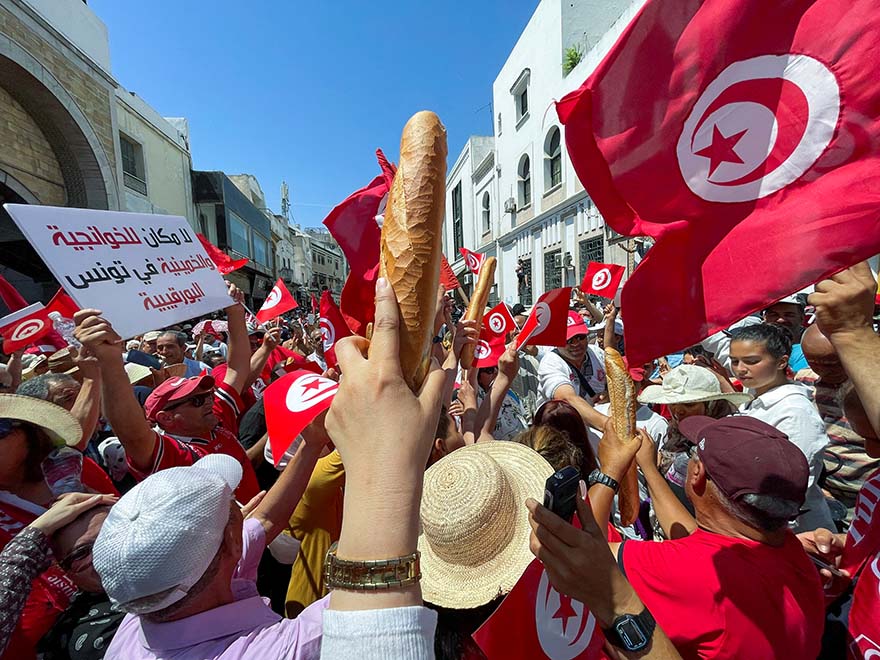Tunisia on a march to one-man rule?

Demonstrators hold loaves of bread as they protest in opposition to a referendum on a new constitution called by President Kais Saied, in Tunis, Tunisia June 18. Photo: Reuters/Jihed Abidellaoui
Sliding back into totalitarianism or taking drastic salvage measures — the president’s proposed new constitution has split the nation.
In a national referendum on 25 July, the people of Tunisia will approve or reject a new constitution proposed by President Kais Saied. The proposed constitution extends presidential power at the expense of parliament and the prime minister. It gives the president sole responsibility for drafting state budgets, and appointing and sacking ministers and judges. This would be a major shift from the current constitution, passed in 2014 after Arab spring protests ended the 23-year rule of Zine El Abidine Ben Ali, which limits presidential powers.
According to Saied, the new constitution is necessary for him to get a mandate to set the crumbling economy on the right course again. Critics view the referendum as nothing less than a constitutional coup in the making. However, many of Saied’s opponents have declared they will boycott the vote, thus making it more likely that the draft passes.
The referendum will be held precisely one year after Saied sacked the prime minister, dissolved parliament and imposed a month-long curfew that was later extended “until further notice”.
.jpg)
Assem Abu Hatab.
“It was in reality a non-military coup. And now the referendum may lead to Tunisia practically reinstalling a dictatorship”, NAI researcher and development economist Assem Abu Hatab remarks. “However, the country’s economy is in deep crisis; inflation is rocketing and food insecurity is alarming. Whatever happens in the referendum, these issues must be addressed urgently”.
Protests in Tunisia in December 2010 became the first spark in the Arab spring uprisings that spread throughout North Africa and the Arab world in 2010-2012, deposing long-term rulers in several countries. For long it was considered the only successful example of democratic change as a result of the protest wave — the other countries soon fell into political turmoil, military rule or even civil war.
In fact, following the adaptation of a new constitution in 2014, Tunisia was considered the only democratic state in the Arab world, according to the Economist Intelligence Unit’s Democracy Index. It was, however, downgraded to being considered a semi-democratic regime after last year’s events.
“The Arab spring was undoubtedly good for democracy in Tunisia, but the economy has suffered ever since. During the long rule of president Ben Ali, Tunisia was the economic role model in the region. Since the revolution, tourism and other businesses have taken big blows”, Abu Hatab says.
Tunisia after the Arab spring
In December 2010, protests broke out over unemployment and political restrictions, and spread nationwide. Ben Ali went into exile the following month. In January 2014, the parliament passed a new constitution after consultations with multiple groups.
Saied was elected president in June 2019. Two years later, he dismissed the prime minister, Hichem Mechichi, suspended the parliament and assumed executive authority with the army’s help. A constitutional referendum is due to take place on 25 July, followed by parliamentary elections in December.
See timeline of all political events in Tunisia External link, opens in new window. since the revolution in 2010.
External link, opens in new window. since the revolution in 2010.
The already constrained economy was hit hard by the Covid-19 pandemic, then war in Ukraine drove up prices of food and fuel. In May, inflation hit a record 7.8 percent; a fifth of the workforce is unemployed.
Saied hopes to turn things round with the help of a US$4 billion loan from the International Monetary Fund (IMF). The opposition and trade unions oppose approaching the IMF because such a loan will come with demands for financial reforms — including wage freezes.
“Saied sees no other option than to rely on the IMF. His opponents are against it without having anything else to offer. However, they may have a point because Egypt recently accepted loans and the accompanying demands from the IMF. So far, it has not eased the economy but rather compounded the situation”, Abu Hatab observes.
“Yet, at the same time, Tunisia is in a serious crisis that could escalate further”, he concludes.
TEXT: Johan Sävström
